Category: Entertainment
The Story Behind the Twirling Tassels: 7 Life Lessons from Lottie the Body
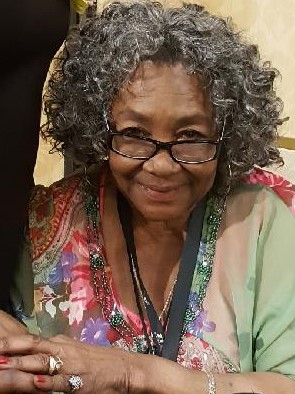
They called her the Gypsy Rose Lee of Detroit, yet exotic dancer Lottie the Body was world famous. Performing during the heydays of burlesque in the 1940s, ‘50s, and ‘60s, she traveled the globe and became a sort of clandestine celebrity. Some people may not have wanted to admit they knew who she was, her being so risqué and all, but they knew. Ask any eighty-five-year-old man if he ever heard of her. If he says “no,” he’s probably lyin’.
Lottie died at age 89 in 2020. She always said that today’s strippers have it all wrong with their “look-at-what-I’ve-got-that-you-can-have” attitude. She insisted it should be “look at what I’ve got that you can’t have,” saying that’s what made it striptease.
“Be a lady. Be classy. Be naughty but never nasty. That’s what made me famous.”
Indeed. Old photos reveal a drop-dead gorgeous African American performer with class galore. It was a combination of looks, talent, and personality that made Lottie a decades-long success on stage. Her costumes were elaborate until she’d peel down to one that was conservative by today’s standards, more than many women wear to the beach these days. She’d start in an elegant gown, take it off to something akin to a sparkly mid-century bathing suit, and maybe, if she felt like it, strip off her top to reveal sequined pasties. The epitome of the act was when she’d twirl the tassels on her pasties, leaving her audience breathless with delight. She was a fabulous dancer and was very athletic, which added to the energy of her show. Audiences – men and women – came to the clubs where she performed to be entertained with a class act, and Lottie did not disappoint.
But there was another thing that made Lottie a truly classy lady: She was a genuinely nice person. I first met her at the Golden Horseshoe “house of burlesque” in Harbor Springs, Michigan, in 1971. I was a lowly twenty-one-year-old college kid waitress, and she was the famous forty-year-old star of the show. I watched the same people – wealthy summer residents, yachters, servicemen, locals, music lovers – come back night after night. Sometimes she’d shimmy her fringed costume, dance like a devilish angel, and merely drop a shoulder strap before exiting the stage.
Oh yeah, they came back. They wanted to see those twirling tassels they’d heard about.
Lottie wasn’t like some of the other performers. She was friendly and chatty with the staff. Even me. She quickly figured out that I was in way over my head in that type of environment – I had to work and that was the only job I could find – and took me under her protective wing. I learned a lot that summer.
She’d worked alongside all kinds of famous people: Sammy Davis, Jr.; B.B. King; Aretha Franklin; T-Bone Walker; Della Reese; Louie Armstrong; the Four Tops; Fats Waller; Sarah Vaughn; Redd Foxx; Cab Calloway; Jackie Wilson; Dinah Washington; and so many more she couldn’t recall all of them. She served as emcee at early Harlem Globetrotters games and was married to Goose Tatum, one of the early players. Before Cuba became a Communist country, she met Fidel Castro and thought him a “sweet little man.” The Philippines’ first lady Imelda Marcos took her shoe shopping. She met civil rights activist W.E.B. DuBois while she performed at the historic recreation community for black people, Idlewild, Michigan. She was best friends with Christine Jorgenson, the first famous transgender American entertainer. Lottie performed all over the U.S., with Alaska being one of her favorite states; throughout the Caribbean; in the Pacific; around Europe; and in northern Africa. All of this and she would help me, a clueless college kid, clean tables at the end of my shift so we could go out to breakfast.
I felt humbled, honored, and happy that such a star would care about somebody like me and treat me as if I were her own daughter. Eventually, she told me to call her Mama Lottie, the nickname she used with her loved ones, and she called me her Baby Boo.
My Mama Lottie, former exotic dancer Lottie the Body, the 2017 Living Legend of the Burlesque Hall of Fame in Las Vegas, was so much more than a body. She embodied the heart and soul of a real woman. We could all, women and men alike, use more Lottie in us. In fact, a lot of Lottie.
So what did I learn from Lottie, the woman who was a second mama to me and a beautiful body to much of the world?
- First of all, not to be ashamed of my body. Although hers was perfection, Lottie always celebrated everybody just the way they were. There was no “I’m the drop-dead gorgeous diva for you to admire;” rather, it was “We’ve all got bodies, so let’s appreciate them.” Everybody felt comfortable around her.
- Secondly, I learned that not all strippers are divas, desperate, or depraved. A few were, but most were not. Certainly not Lottie. I never saw her so much as flirt with a customer. She was a professional who was friendly toward everyone. It seemed as if she was conducting her own kind of civil rights movement that invited everyone to come into her world. Gender, age, race, ethnicity, sexual orientation, religion, abilities, education level, financial status – none of that mattered. What mattered was spending good time together.
- Thirdly, Lottie taught me that dance is an expression of life. She reveled in getting everyone up off their bums to dance. Our favorite night was Thursday, maid and butler night, when the African Americans who worked for wealthy white people at their summer estates in that resort town had the night off. The place was electric! Nobody sat. She’d pull people up on stage; she’d encourage the audience to dance around their dinner tables; she’d jump off the stage and dance in the middle of the crowd. And those were the best tip nights for me, because as maids and butlers they knew the value of hard work. I was usually one of only a few white people in the room on those nights, yet I felt totally included and respected. It was magical, the most fun I’d ever had. And, yes, I eventually overcame my insecurity and shyness and occasionally got up on stage to dance.
- My fourth Lottie lesson was that women should live their lives as they please, not as society or their mother or schooling or a man or the media tells them they should. Well aware there were people who shunned her because of her race as well as her chosen profession – she endured some horrendously bigoted situations in all those years – she focused instead on those who accepted her. She’d experienced many more marvelous times and more good people than frightening times with ignorant cusses, as we called them. We often talked about how more women could benefit from knowing how to find and focus on the good people in this world.
- My fifth lesson from Lottie was that if two people love each other their sex life should be robust. She was married and adored her husband. She didn’t reveal any juicy bedroom secrets to a kid like me, even after many years of friendship, but there was no doubt she enjoyed connubial bliss. Occasionally, she reminded me to do the same, saying a couple’s spat or disagreement should never get in the way of that. And she did have some spicy stories to tell about her younger single days, some very sexy and some quite hilarious. Let’s just say she was not shy.
- The sixth lesson is more general. Enjoy living. Work hard. Laugh a lot. Treasure your friends and family. Eat what you want. Invite new people into your life. Don’t pass up s’mores over a campfire on the beach in the middle of the night. Tell ghost stories. Believe in ghosts and God. And most, of all, treat yourself with respect.
- The final, seventh lesson came in 2019 when I went to Detroit to visit with her after not seeing her in person for several years. We talked on the phone weekly and wrote letters back and forth because she loved letter-writing, but she didn’t travel anymore and I hadn’t been up there in quite a while. Although at age 88 she’d had some health problems, I discovered the same beautiful woman with sparkly brown eyes, velvety skin, and an exuberant personality that I had known for almost half a century. I saw that goodness doesn’t age and kindness never dies.
She once wrote, “Lottie the Body may have brought me fame, but Lottie the Woman has always cared most about one thing: sharing whatever gifts I have to make people happy…. I pray that you may have the same kind of love and happiness that I enjoy. I send my love and God’s blessings to you all.”
In her honor, let’s get up and do a little dance today. And every day after. Let’s celebrate life the way Lottie did – with joy and, most of all, with love.
Postscript: Lottie inspired me to use her stories to write a fictional trilogy, The Burly-Q Girls. It was such an honor to do so. The first book, The Burly-Q Girls: the 6, is now available on Amazon. The others will come out in the spring, The Burly-Q Girls: 6 Dicks, and next autumn, The Burly-Q Girls: 6’ Under, 2022. You can get your copies on Amazon in Kindle, paperback, or large print.
If you want to look her up, simply search for Lottie the Body and you’ll find her. There has never been another like her.
Thanks to MyNorth for including Secrets of the Asylum in books to read

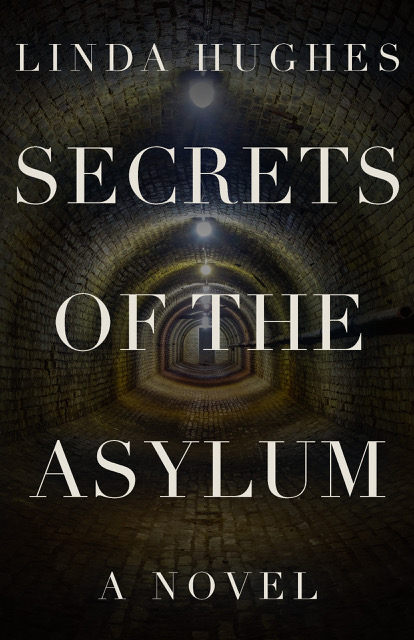
The Day I Met Carrie Fisher

Many years ago I was doing a community building workshop for Toyota at a conference they held for their female employees. There were thousands of women there. One of the keynote speakers was Carrie Fisher. I thought her speech was fantastic. A bit wacky, a lot funny, and very touching, she talked about her life, including how odd it had been to become a Pez dispenser at age 19.
I didn’t expect to meet her close up and personal, but as I was leaving the hotel the next day I stood outside waiting for the taxi the doorman had called for me. Lo and behold, there was Carrie, sitting on a low brick wall, waiting for her limo to arrive. We were the only two people out there. She immediately struck up a conversation, so I sat down beside her to chat.
She asked what I’d been doing there and when she found out I have a degree in counseling, she wanted to know if I thought her family life was odd. She candidly revealed that she’d had a complicated relationship with her mother. Now that she was a mother herself, she appreciated what her mom had gone through to raise her, especially most often as a single mom. Her own mother, the incomparable Debbie Reynolds, had been off making movies a lot when Carrie was young and, being such a huge talent, was a hard act to follow. However, at this point in her life, Carrie appreciated her mom and said she was the best grandmother in the world. She was so grateful they lived next door to each other. When Carrie went off the deep end, which she confessed to doing pretty regularly, her mother was always there to take care of her granddaughter, Carrie’s daughter.
Carrie wanted to know if I thought that was weird. She thought maybe it was, but hadn’t quite figured it out yet. I told her I thought it was perfectly normal to do what’s best for one’s child. She smiled broadly when I said “perfectly normal.”
Her limo came and seeing that we were both going to the airport and that we’d just had such a spontaneously intimate conversation, I felt certain she’d invite me to ride with her. Instead, she got in, waved, and rode off.
Ah, that was Carrie Fisher. Candid. Funny. Real. Alive. Unapologetic. It was a privilege to have met her. I’ve never forgotten our talk, or that beautiful smile.
Outlander’s Inner Lessons
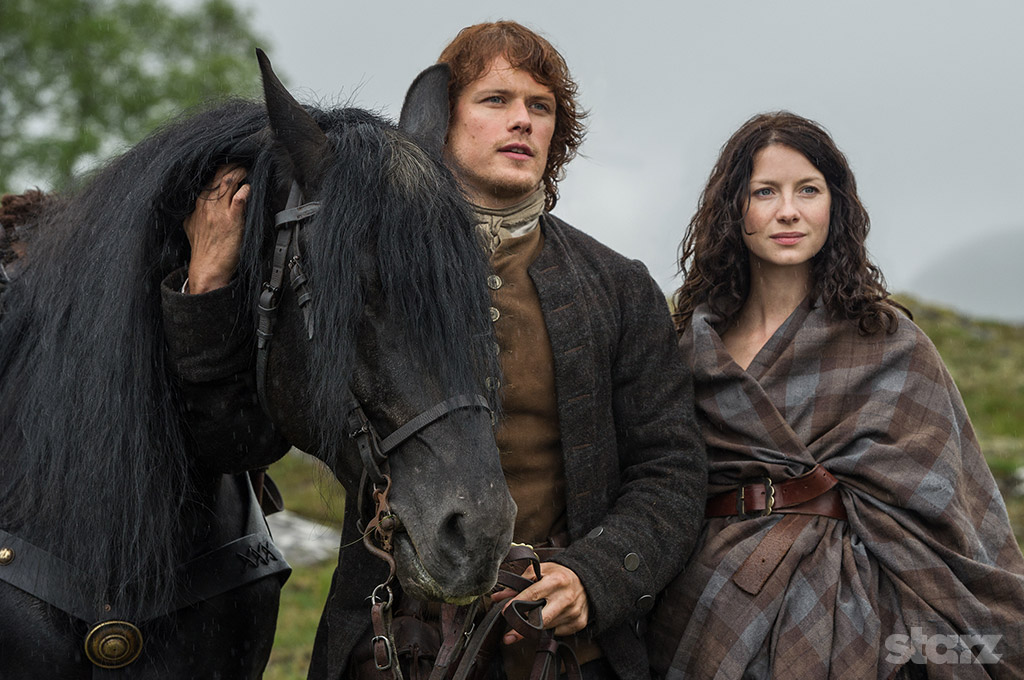
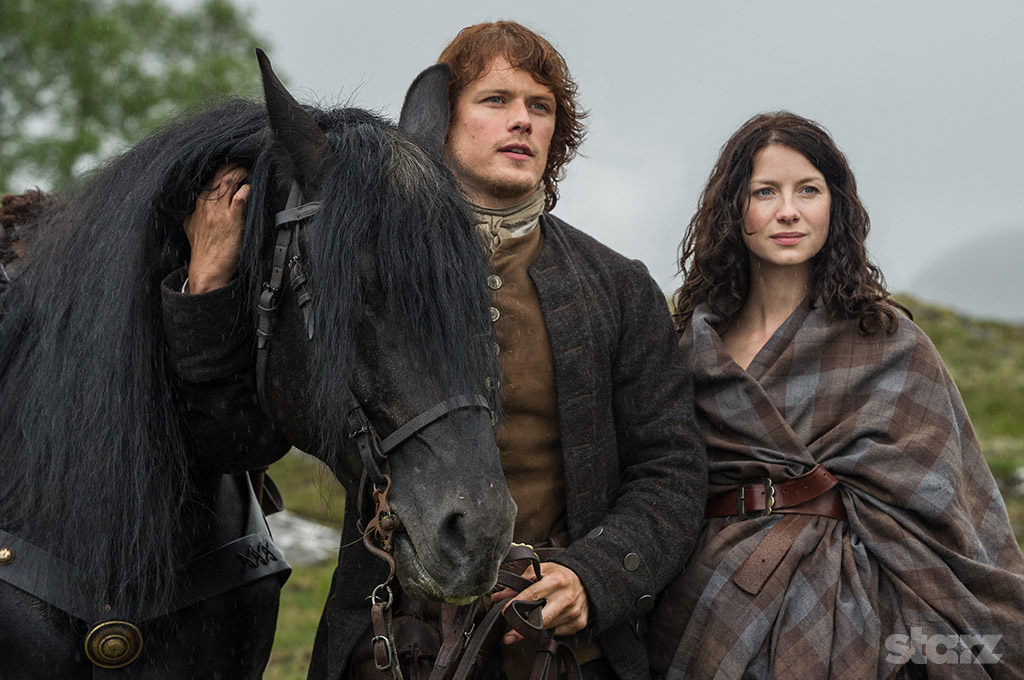 After a week of ruminating about the season finale of Outlander, one of my favorite television shows, I want to write about some of life’s harsh realities, those that we often want to ignore. That episode of the same-sex rape of Jamie Fraser, our hero in the story, by his nemesis the evil “Black Jack” Randall was so prolonged and so authentic viewers were drawn into experiencing Jamie’s pain.
After a week of ruminating about the season finale of Outlander, one of my favorite television shows, I want to write about some of life’s harsh realities, those that we often want to ignore. That episode of the same-sex rape of Jamie Fraser, our hero in the story, by his nemesis the evil “Black Jack” Randall was so prolonged and so authentic viewers were drawn into experiencing Jamie’s pain.
I know I felt it.
I trust that this was Diana Gabaldon’s purpose in creating such a devastating scene: to make us not only think, but feel. To awaken in us a fervid desire to right the injustices of the world. To insist that human beings be treated with care rather than callousness.
Considering the feedback on social media since, most viewers were simultaneously appalled at the brutality of the deed and enthralled by the authenticity of the acting by Sam Heughan, who plays Jamie, and Tobias Menzies, Black Jack. Outlander on Facebook assures us that Tobias is a nice guy and lots of fun. That’s impossible for me to imagine right now, but speaks to the skill of his performance. And Sam allowing himself to be so vulnerable, so beaten, “broken” as he said, took unimaginable dedication to his craft.
So think about this: Jamie is a strong man. He is a leader. He supports his wife’s strength. He believes in the inexplicable. He is smart. He is highly skilled. He has people who love him and who help him in his emotional as well as physical recovery.
Now imagine a child: Not yet grown. Doing whatever adults tell him to do. Not understanding gender roles. Believing only what he is told to believe. Not yet educated. And with no skills for survival on his own.
Imagine that child being raped, as Jamie was, by a Black Jack.
It happens every day. If our strong, independent Jamie could be broken, that child doesn’t stand a chance.
The child sex slave trade is, sadly, alive and well in this world. And it’s not fiction. There are no television crews, no warm trailers, no escapes. It’s the only world the child knows.
And it’s wrong. Outlander shows us how wrong it is when it happens to an adult. It’s even more so with a helpless child. Outlander made us sit up, grit our teeth, and pay attention. It slapped us in the face with the knowledge that we can’t sit by and idly watch a rendering of rape. We must act, in our own neighborhoods, in our towns, in our country, and in our world to stop it. No one – man, boy, woman, girl – deserves to be treated so inhumanly.
Thus my long-held believe that child sex abusers should be sent to prison for life, with no possibility for parole. I have no problem with the death penalty, either.
Let’s hope that’s just what comes Black Jack Randall’s way. Let’s hope for justice for Jamie. And then let’s go out and work for justice for all.
Revelations from a TV Slut
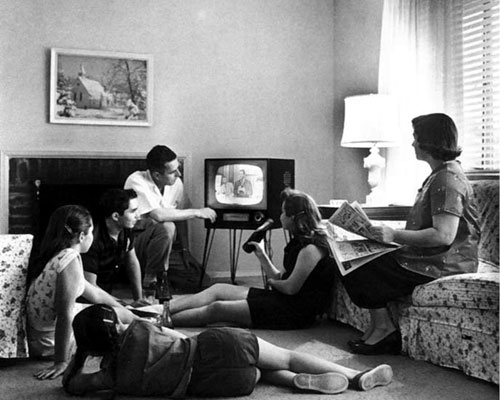
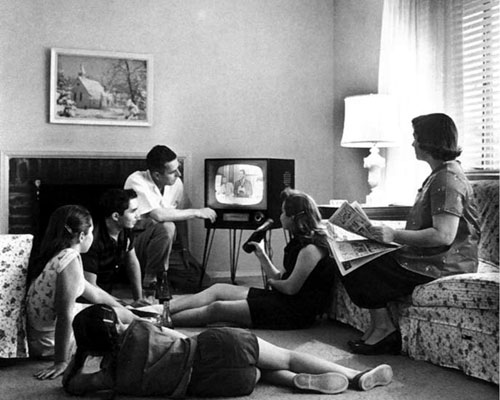 It happened so quickly. There was no forethought; no plan. Before I knew it, I’d fallen into the depths of television depravity, indiscriminately taking in whatever show happened to appear at the end of my clicker. I became a dissolute, slovenly woman: a TV slut. There I sat for three days, watching hour after hour of numbing information float before my eyes.
It happened so quickly. There was no forethought; no plan. Before I knew it, I’d fallen into the depths of television depravity, indiscriminately taking in whatever show happened to appear at the end of my clicker. I became a dissolute, slovenly woman: a TV slut. There I sat for three days, watching hour after hour of numbing information float before my eyes.
It all started with my eyes, actually. After minor eye surgery and being ordered to “rest,” with no reading or computer work possible, and no exertion, I couldn’t think of anything else to do. (Never mind audio books or Rosetta Stone.) So I sat and stared at the tube across the room.
I now know how to lasso an alligator, should the occasion ever arise. I know today’s top value on every shopping channel. (I can’t wait to get the gold cream that’s going to make my aging skin young again.) I was devastated when Annie let her viper mother Judith talk her out of her favorite wedding gown on Say Yes to the Dress. I have been informed of every alleged affair of any man or woman who has ever lived in the White House. I have been convinced that aliens live amongst us. I fell in love with Adam on Bonanza all over again. And I cried when Long Island Medium Theresa delivered a message to a young woman from her departed fiance to go on with her life.
There were lots of snacks and popcorn involved. I’m sure if I’d had some bon-bons, whatever they are, I’d have eaten those, too.
Of course, there were also hours of TCM old movies, which I adore, and lots of Fixer Uppers on HGTV. I watched repeats of my favorite shows, like Outlander and Vikings.
Not all TV is bad. In fact, some is excellent. I loved some of the new shows I discovered. But the key is in being discerning, which I was not, and using that boob tube wisely. We want to be selective rather than slutty; we want to use the medium as an instrument for improving our lives. We want to do that for ourselves and certainly for our children.
I didn’t exactly grow up watching TV. When I was a kid we played outdoors. I thought it was the law or something, but children certainly were not allowed to sit around inside the house. Nor did we want to. There were so many adventures outside! There was the old depot and train tracks across the street, the abandoned house at the end of the road, bike trails through the woods, and Doc Rea’s veterinary barn half a block away. It was always fun to pop in there to see if he had a horse or goat that needed petting. We could walk the two blocks to town where the creek paralleled main street. Springtime was good for wading and letting tadpoles tickle our ankles.
Ah, that is indeed a long-gone era. When I was seven we got our first television set and, as far as I knew, it belonged to my Dad. We kids weren’t allowed to touch it. There weren’t enough seats in the living room anyway, so mom and dad each had their chair, which we did not deign to sit in, and the rest of us sprawled around on the floor, watching what our parents watched. Bonanza. The Loretta Young Show. Gillette Friday Night Fights. Being selective in our watching came without question, which left us lots of time to do other things. The rules relaxed as we got older, but habitual watching didn’t stick with any of us.
So that’s why I was surprised recently when I so quickly fell into mindless watching. What kind of television watcher are you? Selective? Or slutty? I had to work my way out. You can, too. Oh yes, it’s tempting to just stay there on that couch, glaring. It’s so much easier than… life. But, hey, in the end what do you want your tombstone to say? She knew how to sit and stare at a tube. Maybe you’d like something more meaningful than that. I know I would.
Comments are welcome.
#TelevisionWatching #BoobTube #Outlander #Vikings #Bonanza #TVSlut
